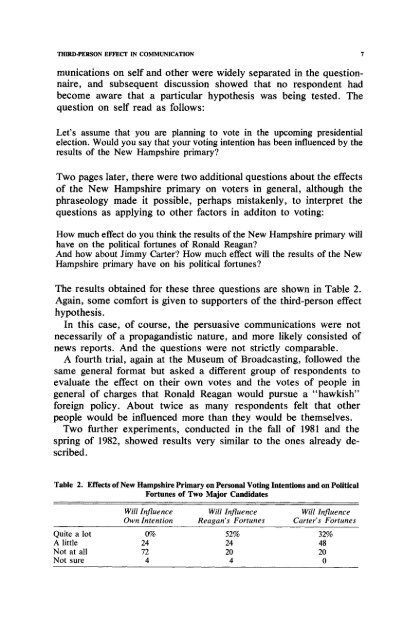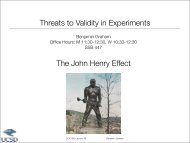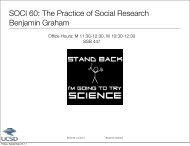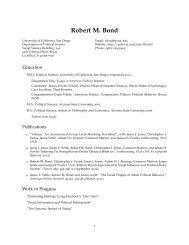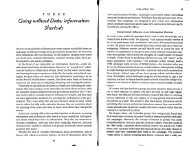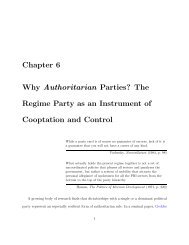The Third-Person Effect in Communication W. Phillips Davison The ...
The Third-Person Effect in Communication W. Phillips Davison The ...
The Third-Person Effect in Communication W. Phillips Davison The ...
Create successful ePaper yourself
Turn your PDF publications into a flip-book with our unique Google optimized e-Paper software.
THIRD-PERSON EFFECT IN COMMUNICATION 7<br />
munications on self and other were widely separated <strong>in</strong> the question-<br />
naire, and subsequent discussion showed that no respondent had<br />
become aware that a particular hypothesis was be<strong>in</strong>g tested. <strong>The</strong><br />
question on self read as follows:<br />
Let's assume that you are plann<strong>in</strong>g to vote <strong>in</strong> the upcom<strong>in</strong>g presidential<br />
election. Would you say that your vot<strong>in</strong>g <strong>in</strong>tention has been <strong>in</strong>fluenced by the<br />
results of the New Hampshire primary?<br />
Two pages later, there were two additional questions about the effects<br />
of the New Hampshire primary on voters <strong>in</strong> general, although the<br />
phraseology made it possible, perhaps mistakenly, to <strong>in</strong>terpret the<br />
questions as apply<strong>in</strong>g to other factors <strong>in</strong> additon to vot<strong>in</strong>g:<br />
How much effect do you th<strong>in</strong>k the results of the New Hampshire primary will<br />
have on the political fortunes of Ronald Reagan?<br />
And how about Jimmy Carter? How much effect will the results of the New<br />
Hampshire primary have on his political fortunes?<br />
<strong>The</strong> results obta<strong>in</strong>ed for these three questions are shown <strong>in</strong> Table 2.<br />
Aga<strong>in</strong>, some comfort is given to supporters of the third-person effect<br />
hypothesis.<br />
In this case, of course, the persuasive communications were not<br />
necessarily of a propagandistic nature, and more likely consisted of<br />
news reports. And the questions were not strictly comparable.<br />
A fourth trial, aga<strong>in</strong> at the Museum of Broadcast<strong>in</strong>g, followed the<br />
same general format but asked a different group of respondents to<br />
evaluate the effect on their own votes and the votes of people <strong>in</strong><br />
general of charges that Ronald Reagan would pursue a "hawkish<br />
foreign policy. About twice as many respondents felt that other<br />
people would be <strong>in</strong>fluenced more than they would be themselves.<br />
Two further experiments, conducted <strong>in</strong> the fall of 1981 and the<br />
spr<strong>in</strong>g of 1982, showed results very similar to the ones already de-<br />
scribed.<br />
Table 2. <strong>Effect</strong>s of New Hampshire Primary on <strong>Person</strong>al Vot<strong>in</strong>g Intentions and on Political<br />
Fortunes of Two Major Candidates<br />
Will Influence Will Influence Will Influence<br />
Own Intention Reapan's Fortunes Carter's Fortunes<br />
-<br />
Quite a lot 0% 52% 32%<br />
A little 24 24 48<br />
Not at all 72 20 20<br />
Not sure 4 4 0


